 Politicians avoid healthcare. Aside from platitudes and cow towing to Medicare, we never hear substantive debate about healthcare in Canada.
Politicians avoid healthcare. Aside from platitudes and cow towing to Medicare, we never hear substantive debate about healthcare in Canada.
No surprise, we’ve heard very little about it in the Ontario election. We need debate. We need courageous politicians who will dig into the issues.
Hudak wants to scrap the LHINs. I can’t blame him. With a limited mandate, LHINs struggle to demonstrate their value add. Too bad Hudak didn’t have more substance to his healthcare vision. He knows he can’t take on the unions and expect to win an election.
Wynne wants to give nurses what they want: more power but no more responsibility. She doesn’t want to get them to do what’s within their scope of practice already. Wynne’s just buying off the unions.
Howarth thinks ED wait times require more money, more providers… Regular readers of this blog know that EDs do not need more money. Hospitals need new governance, less pandering to unions. Howarth does not know EM care or process. God help EM services if the NDP wins the election on this platform.
With only a few weeks and one debate left, maybe we can get party leaders to talk about healthcare. Let them know what you think. Ask them for debate. Let them know you think it’s important. Shoot them an email or send a letter to the editor. Ask them to be courageous!
(photocredit: news.nationalpost.com)


